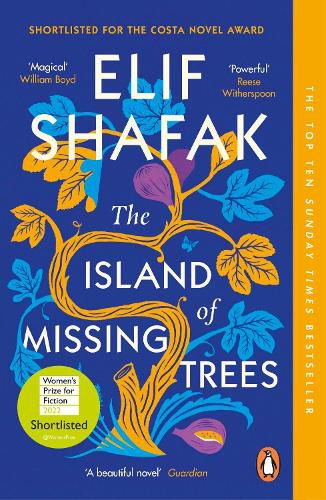The Island of Missing Trees
Elif Shafak

The Island of Missing Trees
Elif Shafak
Two teenagers, a Greek Cypriot and a Turkish Cypriot, meet at a taverna on the island they both call home.
The taverna It is 1974 on the island of Cyprus. Two teenagers, from opposite sides of a divided land, meet at a tavern in the city they both call home. The tavern is the only place that Kostas, who is Greek and Christian, and Defne, who is Turkish and Muslim, can meet, in secret, hidden beneath the blackened beams from which hang garlands of garlic, chilli peppers and wild herbs. This is where one can find the best food in town, the best music, the best wine. But there is something else to the place- it makes one forget, even if for just a few hours, the world outside and its immoderate sorrows.
In the centre of the tavern, growing through a cavity in the roof, is a fig tree. This tree will witness their hushed, happy meetings, their silent, surreptitious departures; and the tree will be there when the war breaks out, when the capital is reduced to rubble, when the teenagers vanish and break apart.
Decades later in north London, sixteen-year-old Ada Kazantzakis has never visited the island where her parents were born. Desperate for answers, she seeks to untangle years of secrets, separation and silence. The only connection she has to the land of her ancestors is a Ficus Carica growing in the back garden of their home.
In The Island of Missing Trees, prizewinning author Elif Shafak brings us a rich, magical tale of belonging and identity, love and trauma, memory and amnesia, human-induced destruction of nature, and, finally, renewal.
Review
Tristen Brudy
Ada is 16 years old and struggling to fit in. She’s lost her mother, Defne, and she can’t connect with her father, Kostas. He’s physically present but emotionally distant. One day at her school in North London, Ada snaps, screaming uncontrollably. In response, Ada’s father invites her maternal aunt, Meryem, to visit from Cyprus. To Ada, Meryem holds the key to understanding her parents’ secret past and the legacy of trauma that Defne and Kostas brought with them from Cyprus to London.
Flashback to 1974: two teenagers are falling in love. Kostas is Greek and Christian; Defne is Turkish and Muslim. If the wrong people – including their families – find out, their very lives could be in danger. They find refuge at a local tavern, underneath the shade of a fig tree that grows through a hole in the roof of the building. The safety they feel, however, is illusory. War breaks out and the island is divided in two.
The Island of Missing Trees is a story about trauma, how it lives in bodies and is passed down through generations. The novel is written in Elif Shafak’s signature lyrical style – she writes about atrocities in something closer to poetry than prose. Shafak is prone at times to sentimentality – I couldn’t quite connect with the sentient fig tree – but it also feels cynical to criticise her methods of working through such a sensitive topic. This is a heartbreaking but ultimately hopeful work about what divides us and what brings us together.
Tristen Brudy is a bookseller at Readings Carlton.
This item is in-stock at 6 shops and will ship in 3-4 days
Our stock data is updated periodically, and availability may change throughout the day for in-demand items. Please call the relevant shop for the most current stock information. Prices are subject to change without notice.
Sign in or become a Readings Member to add this title to a wishlist.





